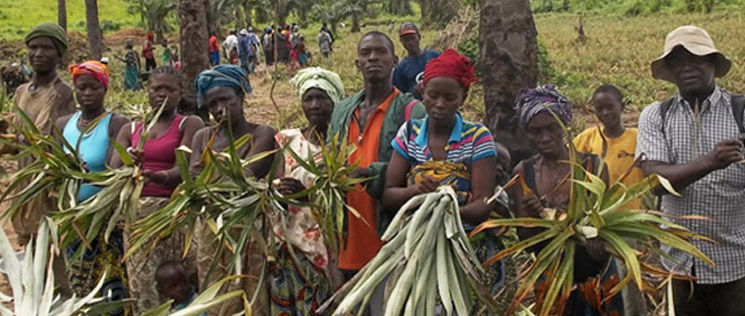
Village Partnerships: Makoni Line

Partner: Victory Highway (Painted Post, NY)
Population: 2100
Households: 161
Status: Active
Location: Magburaka-Kono Highway, Sierra Leone
GPS Coordinates: N08,38,416, W011,N34.535
Village History
Makoni Line is a rural community located in Matokara section, Konike Barina chiefdom, Tonkolili District, Northern Province of Sierra Leone. Themne is the common spoken language.
The community has a primary school with an enrollment of 430 children and one Junior Secondary School with an enrollment of 222. The two schools serve six communities all within a two to three miles radius.
Even though members of this community are either Christians or Muslims, they live in peace and harmony as demonstrated in the composition of the village cooperative. This VC planted one of the highest number of acres of pineapple suckers. They have a membership of 82, 40 women and 42 men.
Completed Activities & Impact
Victory Highway Wesleyan Church began a Village Partnership with the village of Makoni Line, Sierra Leone in the summer of 2014. Facilitated by World Hope International, Victory Highway’s generosity has helped to promote leadership development, improved farming and agriculture training and development, and spiritual growth in this rural village located in the Tonkolili District.
Agriculture
The people in Makoni Line are predominantly subsistence farmers and traditionally grow mostly cereals crops (ground nut and rice sorghum) as well as tuber crops such as yams, cassava and sweet potato. Through this village partnership, World Hope International helped to organize farmers into village cooperatives so they can work more effectively with one another. From 2012 to 2014, the cooperative supplied the highest number of mangoes to Africa Felix Juice (AJF), international juice processing company, than any other village cooperative.
With assistance from their partners – Victory Highway Wesleyan Church and in collaboration with World Hope International in 2014, the village cooperative cultivated 7.1 acres of pineapple farm. In 2016, the village cultivated 6 acres of papaya. These two crops are in high demand both in the fresh market and provide a year-round income for farmers.
Furthermore, in 2016, WHI distributed 60 bushels or bags of peanut seed and 70 bushels of rice to community members. All beneficiaries already have either rice or peanut farms and will use the new seeds to enlarge their farms. The first harvest is expected in September for peanuts and December for rice. Farmers will pay back to the community seed bank and the next selected farmers will receive the seed loan.
Finally, it is common for villages to go with very little food for two months each year. These are known as “the hungry months.” This happens when a family’s stock of staple dried food runs out or spoils. The main staple foods are rice and peanuts, and drying is one of the few ways that the people have to preserve food between harvests. As such, WHI constructed two concrete drying floors to help significantly reduce post-harvest losses of such staple crops.
This community has no safe drinking and no proper toilet facilities. In 2016, WHI built one water well to help provide clean and safe drinking water to the community.
Rural and Economic Development
In 2016, WHI constructed a new church in partnership with Victory Highway Wesleyan Church. It was built and furnished with benches, chairs, table and a Bible stand.
Health and Nutrition
WHI disseminated 200 insecticide-treated nets to pregnant women, lactating mothers, elderly people, and others in Makonie Line. The nets help to kill and repel mosquitoes carrying malaria, one of the leading causes of death in Africa.